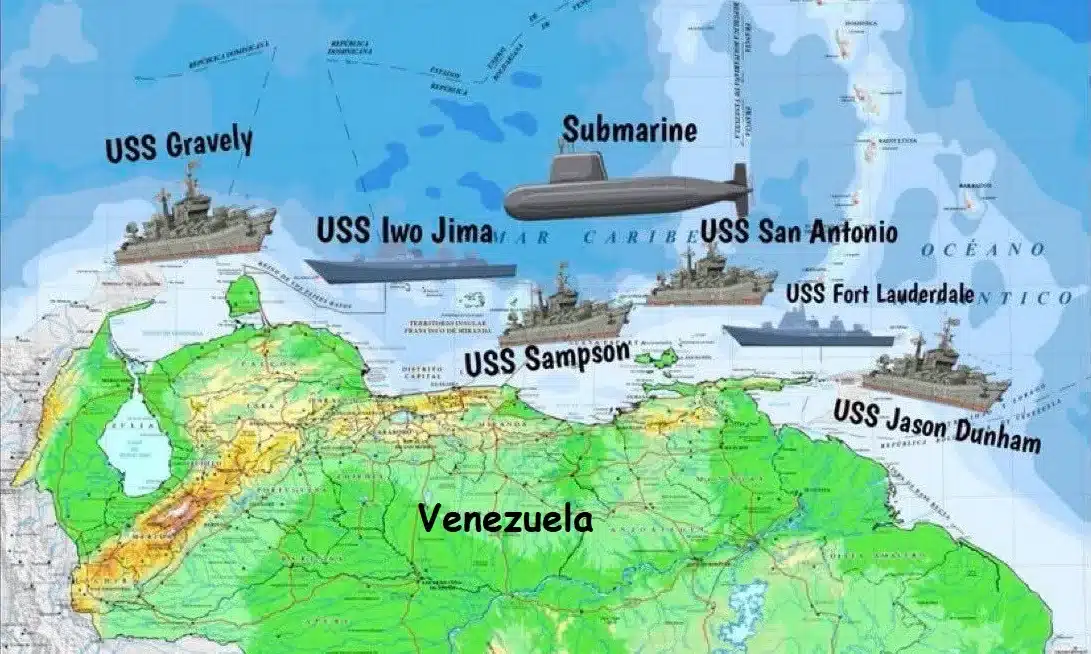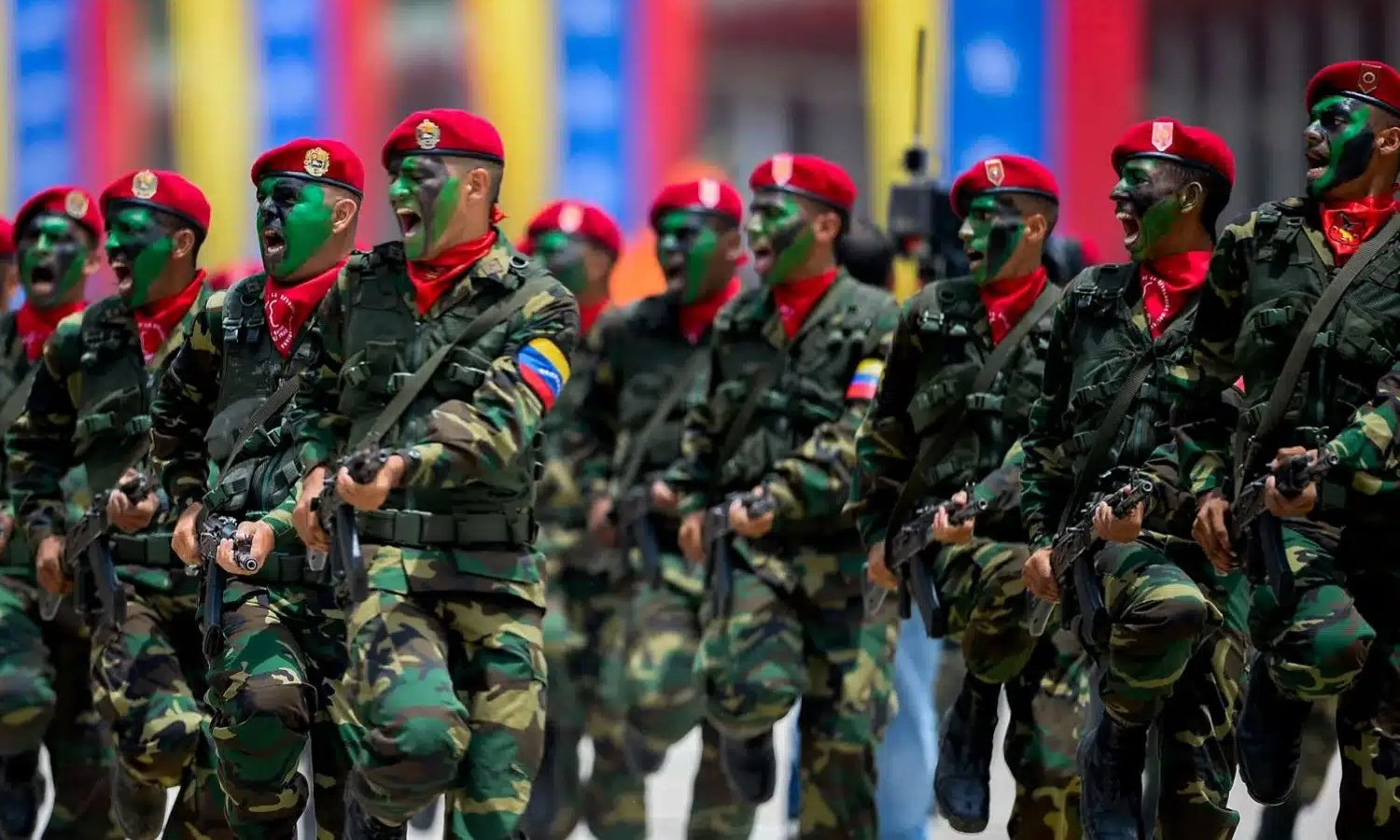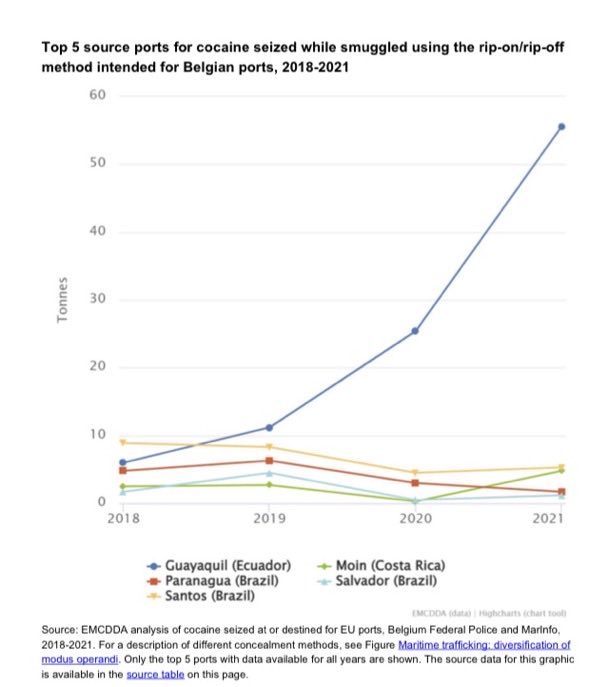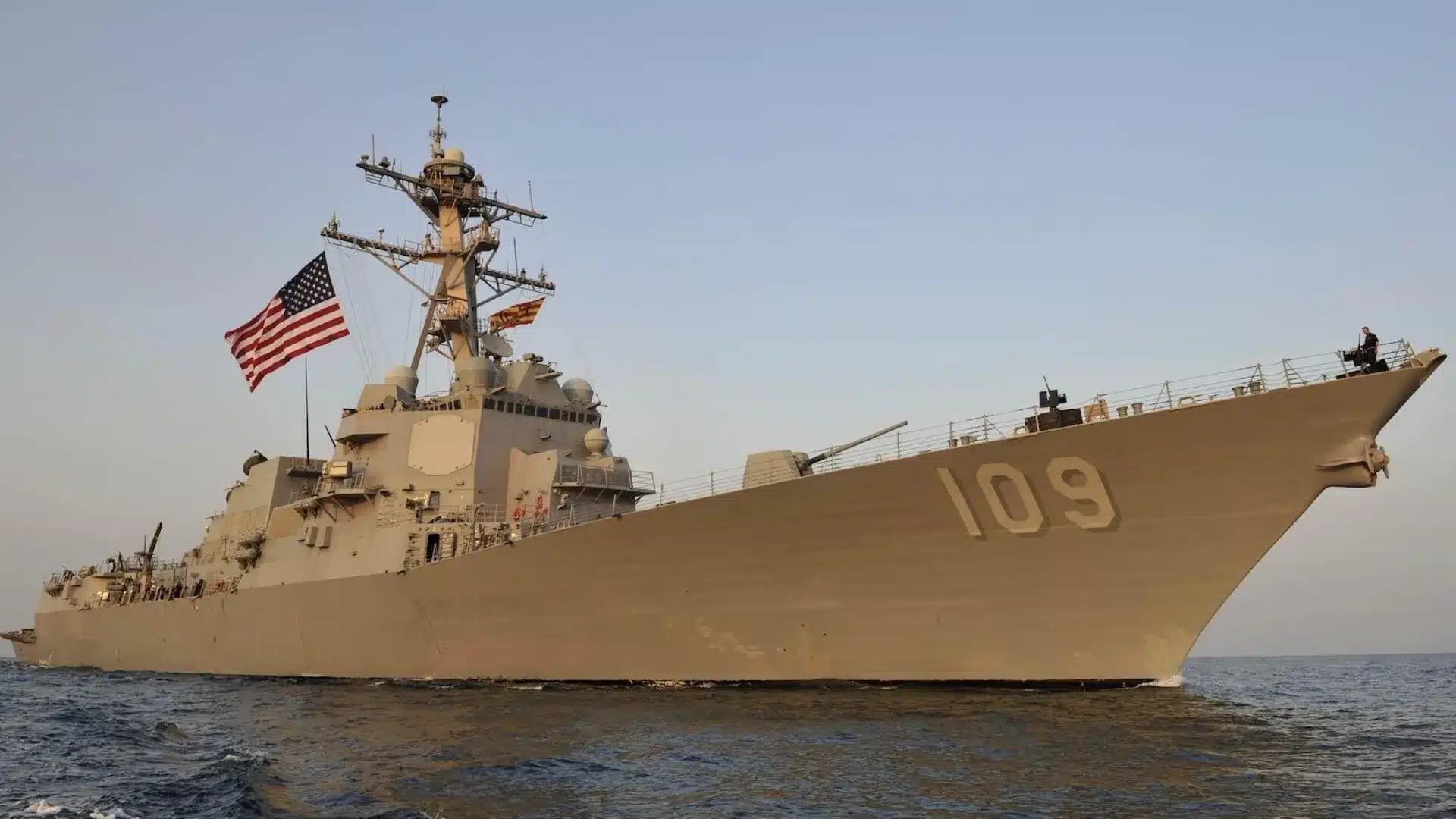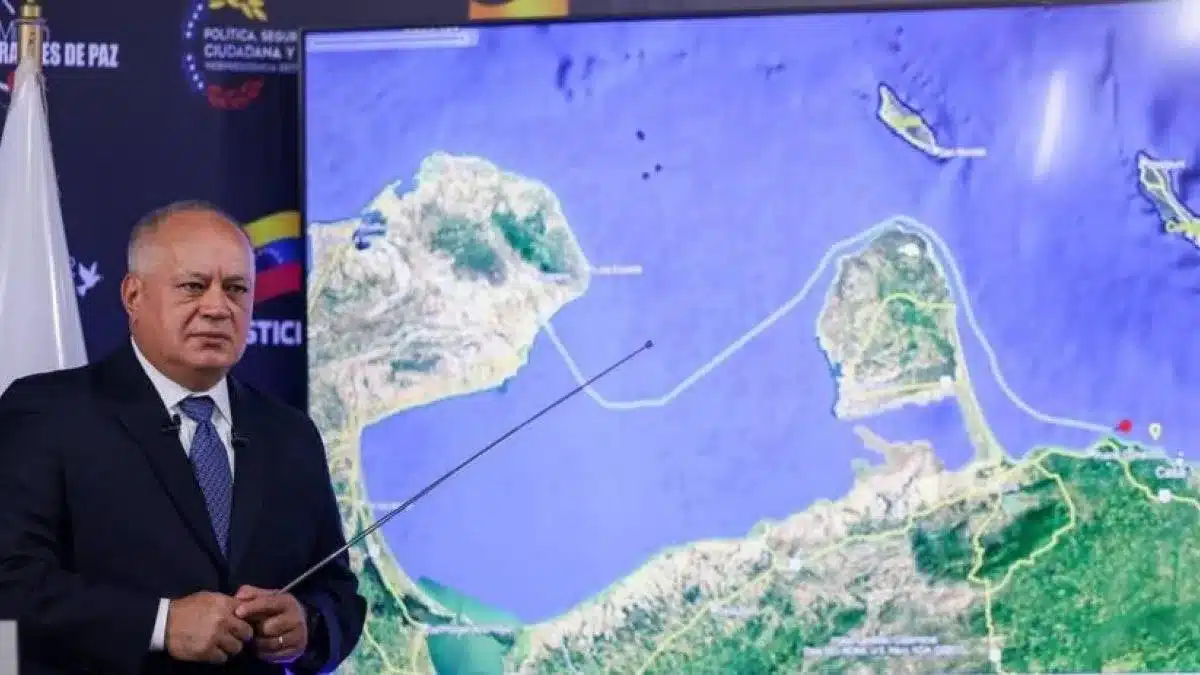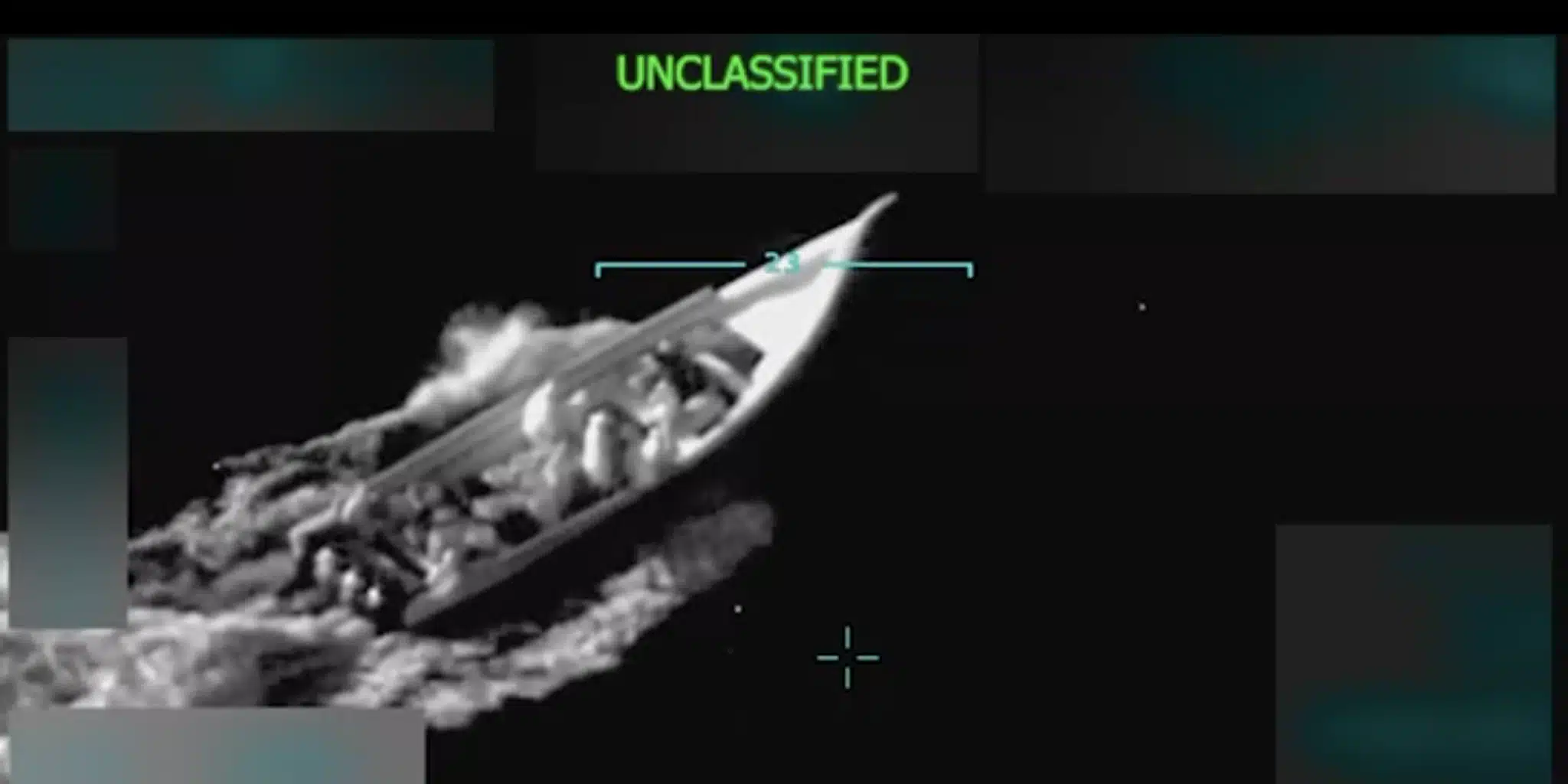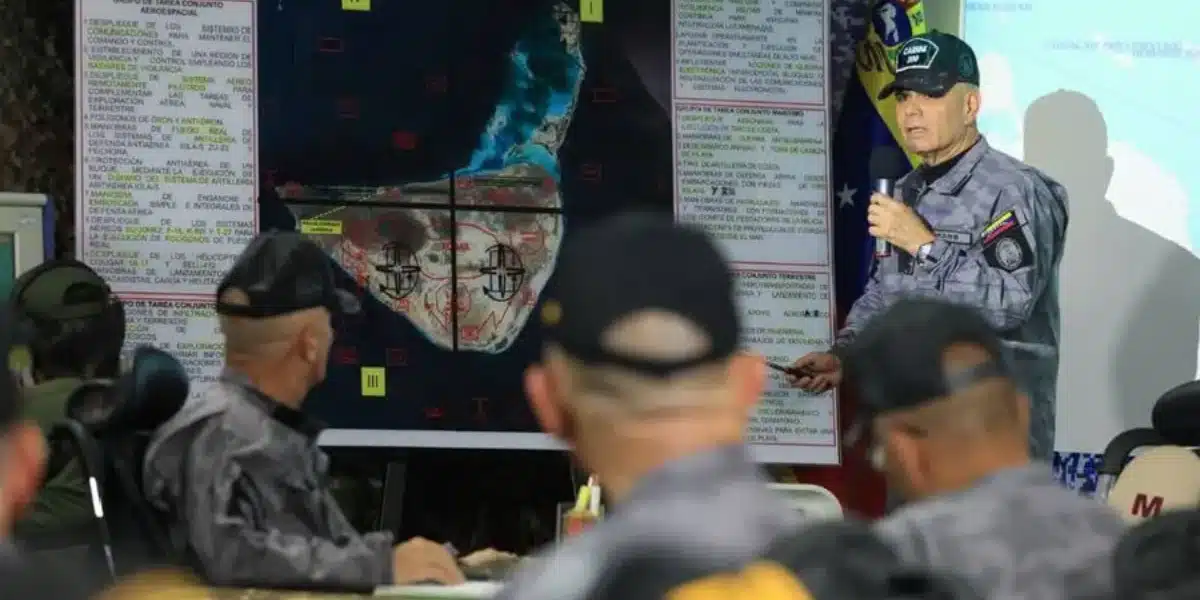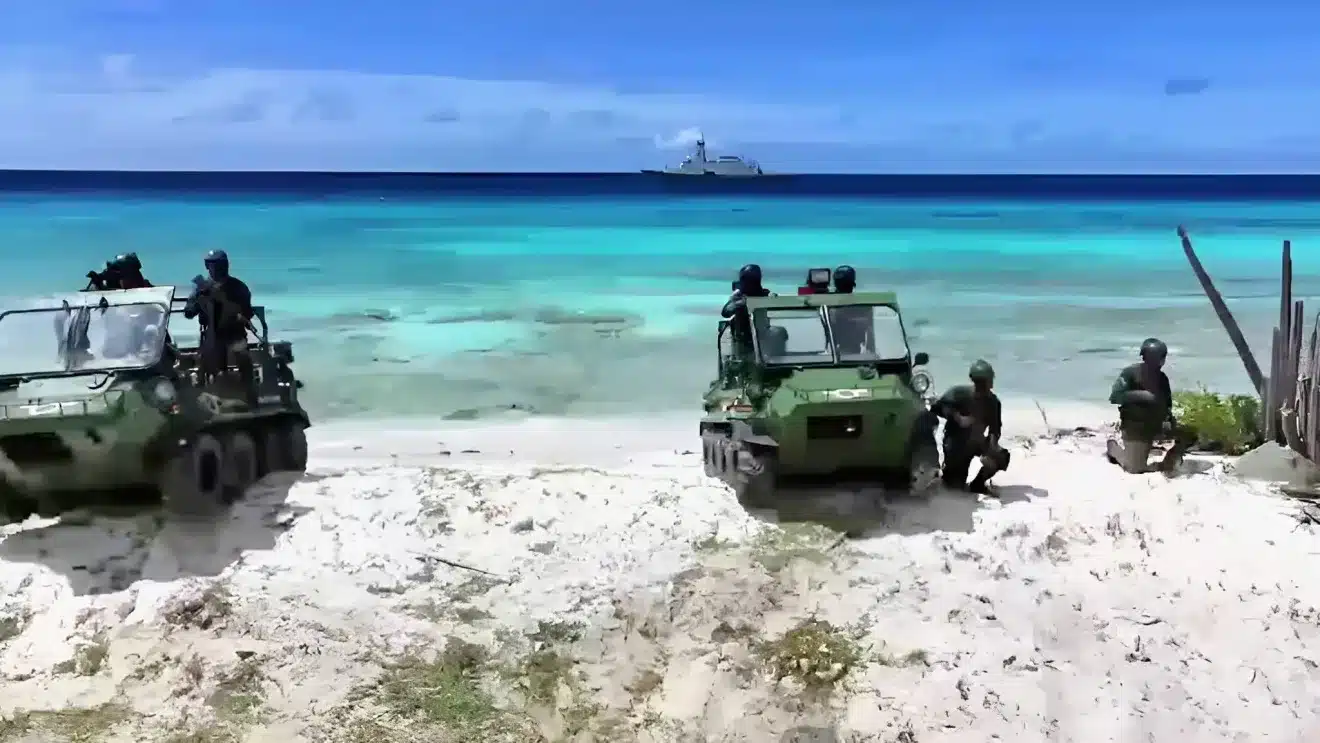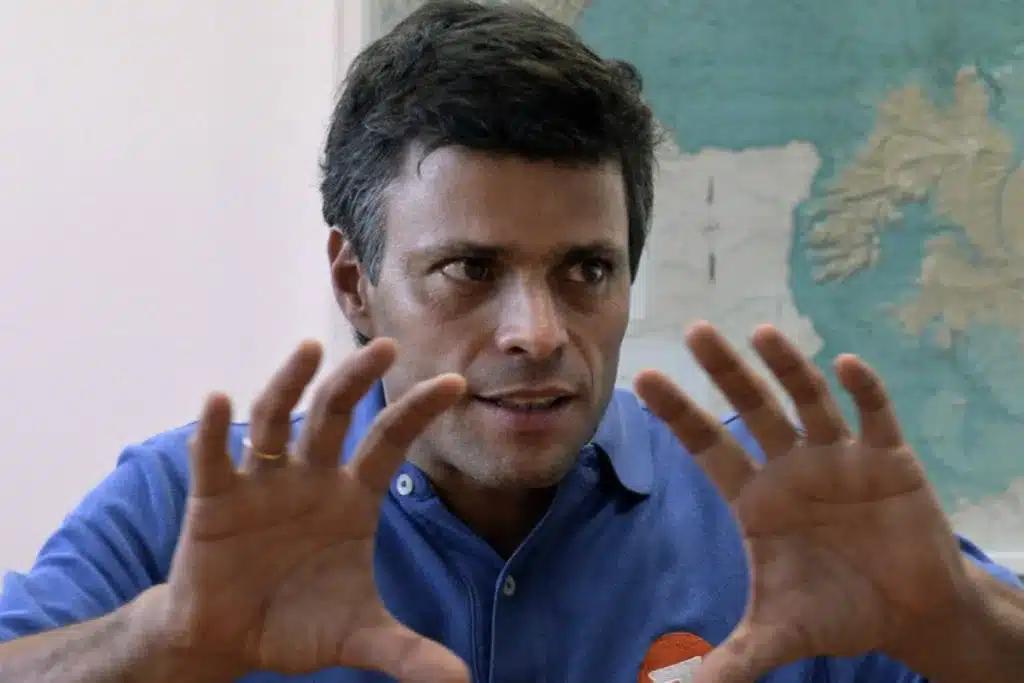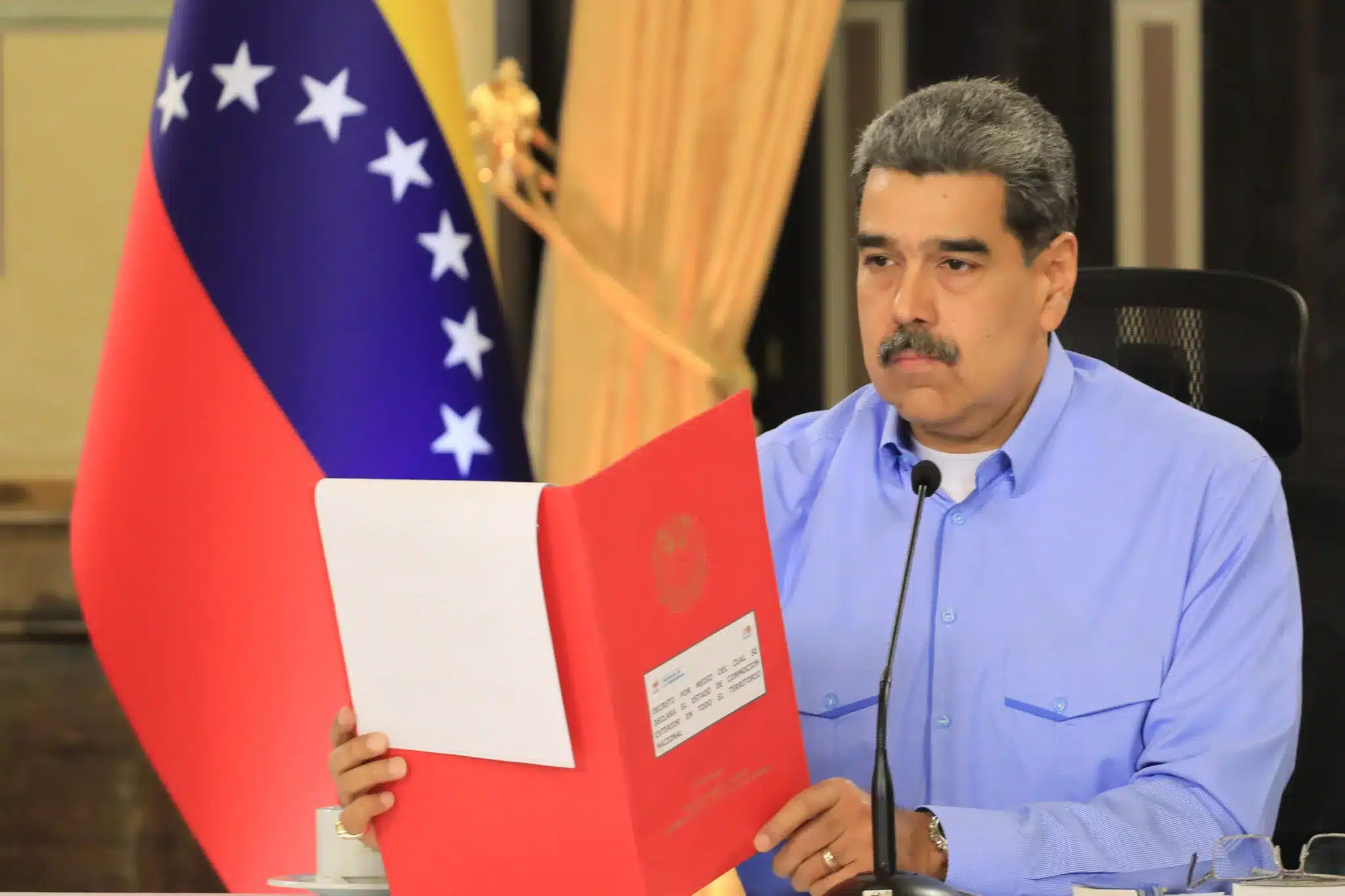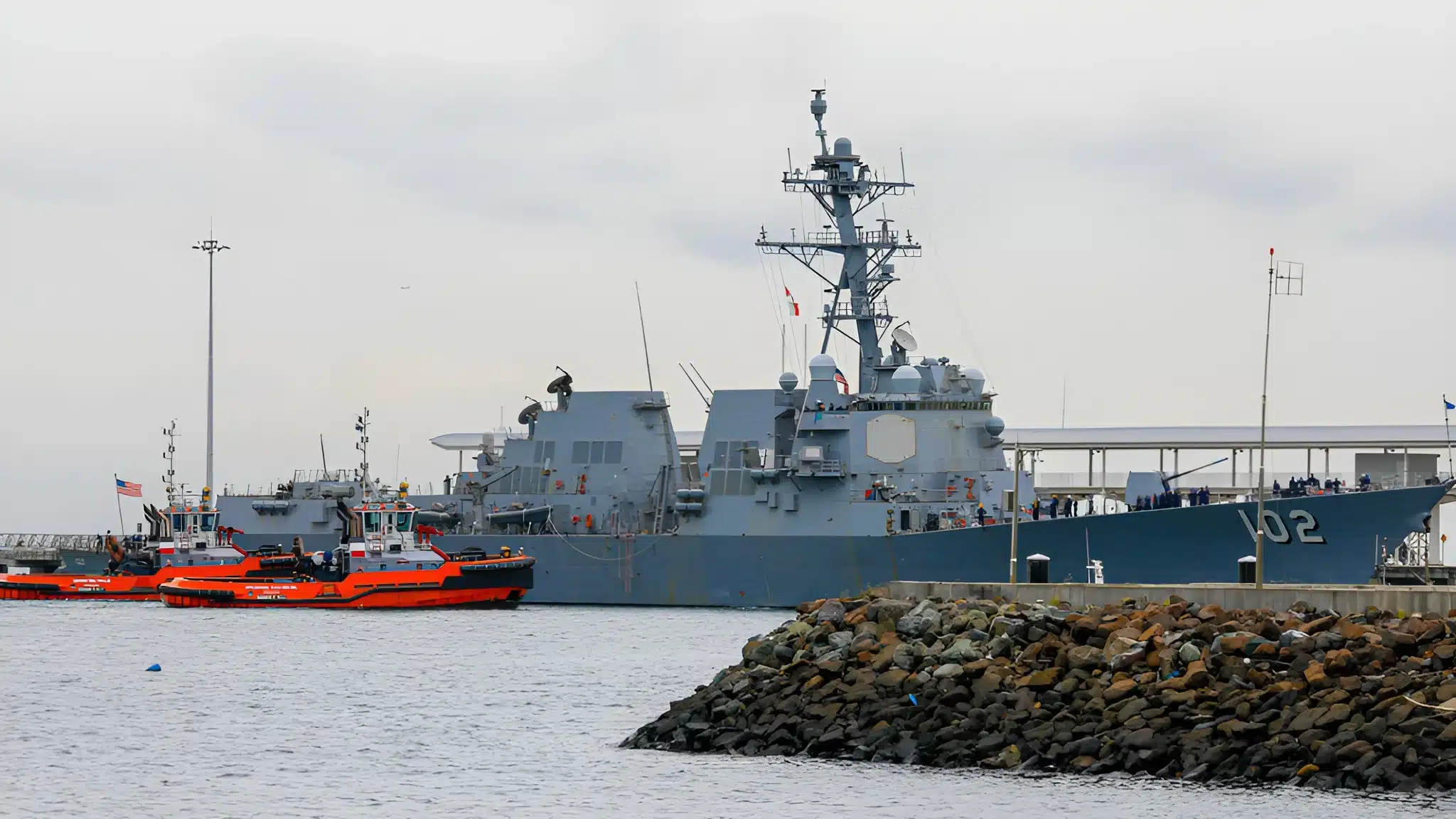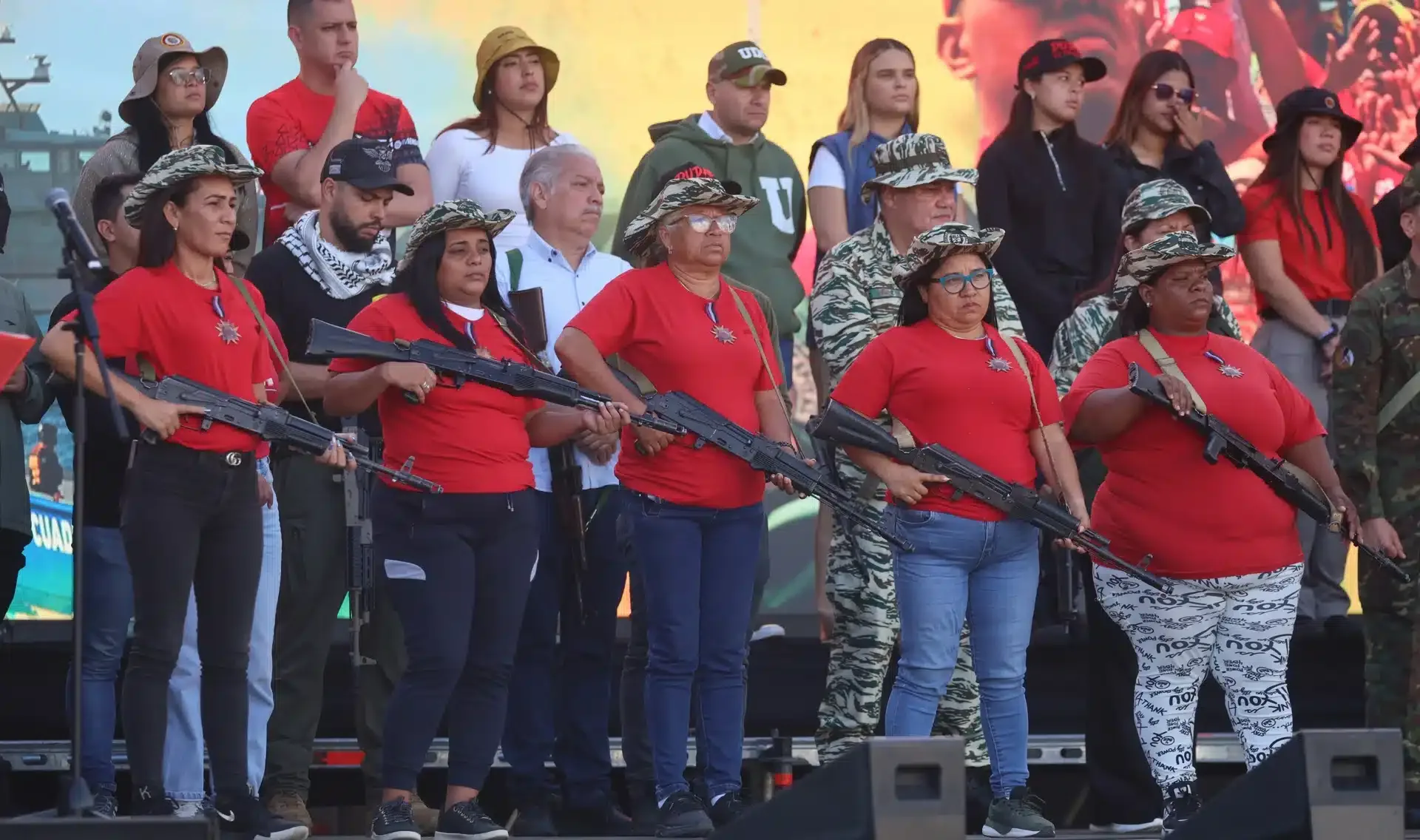September 2, 2025
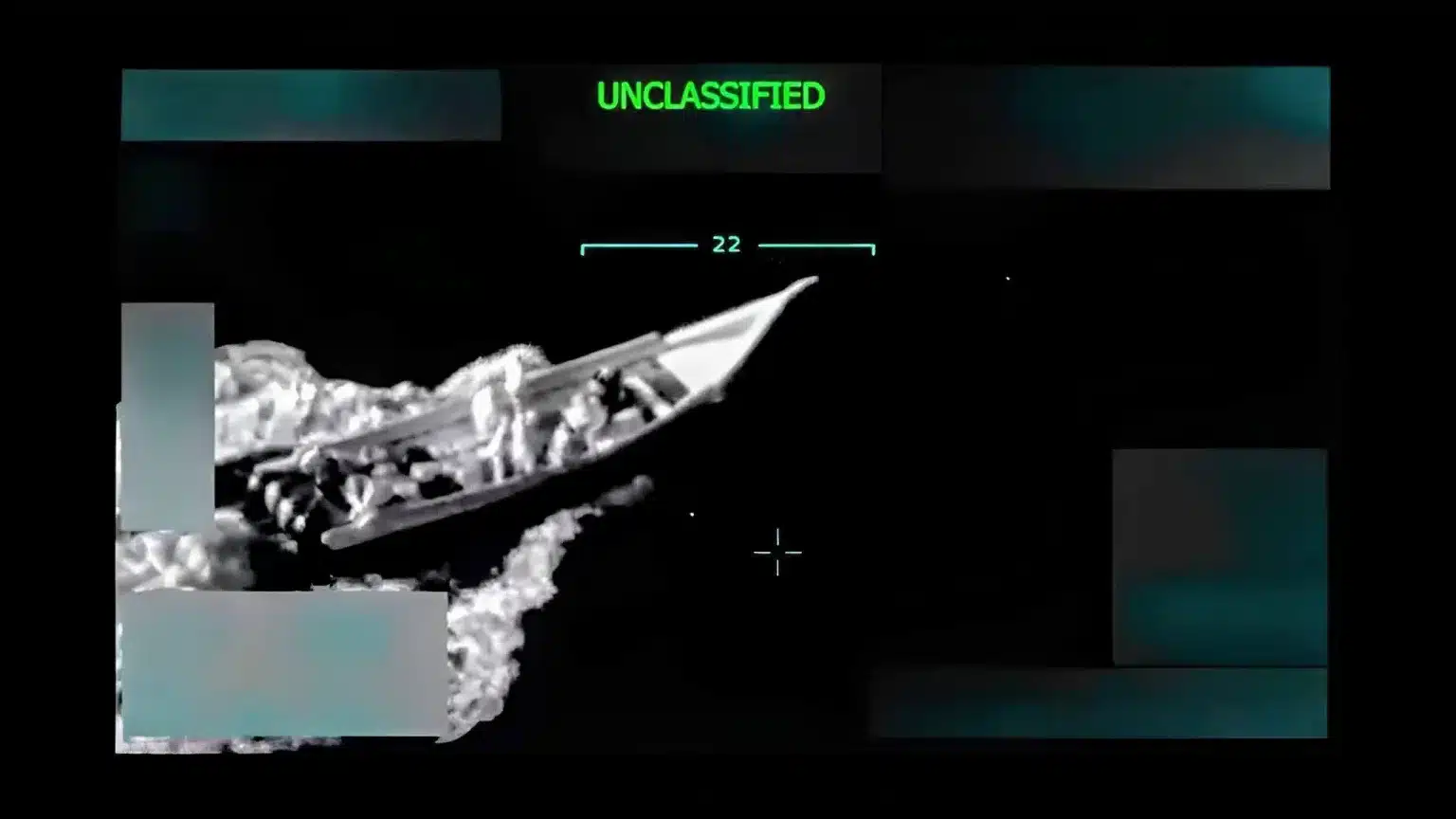
Screenshot of a video footage release by the US Department of Defense showing the strike against a small boat allegedly carrying drugs. Photo: CNN.
Caracas (OrinocoTribune.com)—President Donald Trump claimed Tuesday that US troops deployed to the Caribbean attacked and destroyed a “drug ship” that had left Venezuela.
“Just a few minutes ago, literally, we shot down a vessel that was carrying drugs, a large amount of drugs. You’ll see it and read about it. It just happened moments ago,” the US president said at a press conference in the Oval Office.
He said he had just been briefed on the matter by the chairman of the Joint Chiefs of Staff, General Daniel “Razin” Caine. “We have a lot of drugs coming into our country, coming in for a long time, and they just came out of Venezuela… A lot of things are coming out of Venezuela, so we got rid of them,” Trump said.
Official account and unanswered questions
The US Department of Defense Rapid Response X account posted Donald Trump’s statement from Truth Social: “Earlier this morning, on my orders, US Military Forces conducted a kinetic strike against positively identified Tren de Aragua (TdA) narcoterrorists in the SOUTHCOM area of responsibility. TdA is a designated Foreign Terrorist Organization, operating under the control of Nicolas Maduro [sic], responsible for mass murder, drug trafficking, sex trafficking, and acts of violence and terror across the United States and Western Hemisphere. The strike occurred while the terrorists were at sea in international waters transporting illegal narcotics, heading to the United States. The strike resulted in 11 terrorists killed in action. No US Forces were harmed in this strike.”
Following Trump’s remarks, US Secretary of State Marco Rubio called the action a “lethal attack.” He said the “drug ship” had departed from Venezuela and “was being operated by a narcoterrorist organization.”
Neither Rubio nor the president offered details on where exactly the attack occurred, how it was determined that the vessel came from Venezuelan territory, or what procedure was used to identify the cartel in charge of the transfer. No tracking data or intelligence reports were immediately provided to support the claim.
This would be the first attack by US forces since they were deployed to the southern Caribbean Sea to allegedly combat drug trafficking.
A narrative without support?
The US official account has been met with skepticism from analysts and media. A low-quality video released by the US Defense Department shows a small boat at high speed before being struck and set ablaze. Some social media users and analysts questioned the operation’s veracity, noting the boat’s small size and suggesting it could only carry a minuscule amount of drugs compared to the US demand for narcotics.
In a social media post, Venezuelan news outlet Venezuelanalysis speculated on how US SOUTHCOM knew the small boat was carrying drugs without carrying out an inspection. The editor of Orinoco Tribune, when consulted, questioned how US forces could have known that any narcotics on board (if there were any) were the property of the Tren de Aragua gang; how they could have been certain that the boat was heading to the US, hundreds of miles away; and how a country can strike boats at sea without judicial procedure. “There is certainly a breach of international law,” he added, while noting that a detailed inspection of the video footage only shows at most seven people aboard of the boat.
Tren de Aragua is a virtually defunct Venezuelan criminal gang infamous for extortion, kidnapping, and human trafficking. Drug trafficking was never a strength of this criminal organization, although it may have carried out narcotics deals on a small scale.
On social media, many are wondering if the 11 individuals were innocent people, possibly migrants. If so, this would constitute yet another US “false-positive” operation and add to the long list of human rights violations and breaches of international law carried out by the US.
Regional tensions escalate
Tensions between Caracas and Washington have escalated since last August, when US Attorney General Pam Bondi announced an increase from US $25 million to US $50 million for information leading to the “capture” of Venezuelan President Nicolás Maduro. She accuses him, without public evidence, of leading several international drug trafficking organizations. Currently, the Venezuelan president is being accused by the US government of leading Tren de Aragua, the Cartel of the Suns, and even the Mexican Sinaloa Cartel.
These accusations have been denied by Venezuelan authorities and by various countries. Reports from organizations such as the United Nations (UN) present Venezuela as a country free of illicit crops, with only 5% of the cocaine produced in Colombia passing through it. According to UN reports, the majority (87%) of drugs traveling from South America to North America do so across the Pacific Ocean, which is not connected to the Caribbean Sea, where Venezuela’s entire oceanic coastline is found.
In this regard, Pino Arlacchi, a former United Nations under-secretary-general and expert on organized crime, published an article questioning the US military deployment against Venezuela. He called it a veiled regime-change operation lacking support and aimed at Venezuelan oil reserves.
Amid the tensions over the US military deployment, President Maduro stated on Monday, September 1, that his country “is facing the greatest threat” of the last century. He said Washington has deployed eight military ships, a nuclear submarine, and 1,200 missiles aimed at Venezuelan soil.
According to mainstream media reports, the US squadron includes the amphibious assault ship USS Iwo Jima and the ships USS San Antonio and USS Fort Lauderdale, with about 4,500 military personnel on board. Other ships, including the destroyers USS Gravely, USS Jason Dunham, and USS Sampson, as well as the nuclear-powered fast-attack submarine USS Erie, are reportedly heading toward Venezuelan waters.
Maduro warned that “if Venezuela were attacked, it would immediately enter a period of armed struggle in defense of the national territory and the history and people of Venezuela.” He said the country would “constitutionally declare a Republic in arms.”
Additionally, at an extraordinary meeting of foreign ministers of the Community of Latin American and Caribbean States (CELAC), Foreign Minister Yván Gil demanded “the immediate withdrawal of US military assets from the Caribbean Sea,” calling it an unprecedented situation only comparable to the missile crisis of the 1960s.
There has not yet been an immediate official reaction from Venezuelan authorities to Tuesday’s boat incident.
https://orinocotribune.com/us-forces-de ... 11-killed/
******
The Communist Party of Venezuela enters a new stage
Anti-imperialist and loyal to the Bolivarian process, the PCV keeps marching forward.
Lalkar writers
Tuesday 1 July 2025
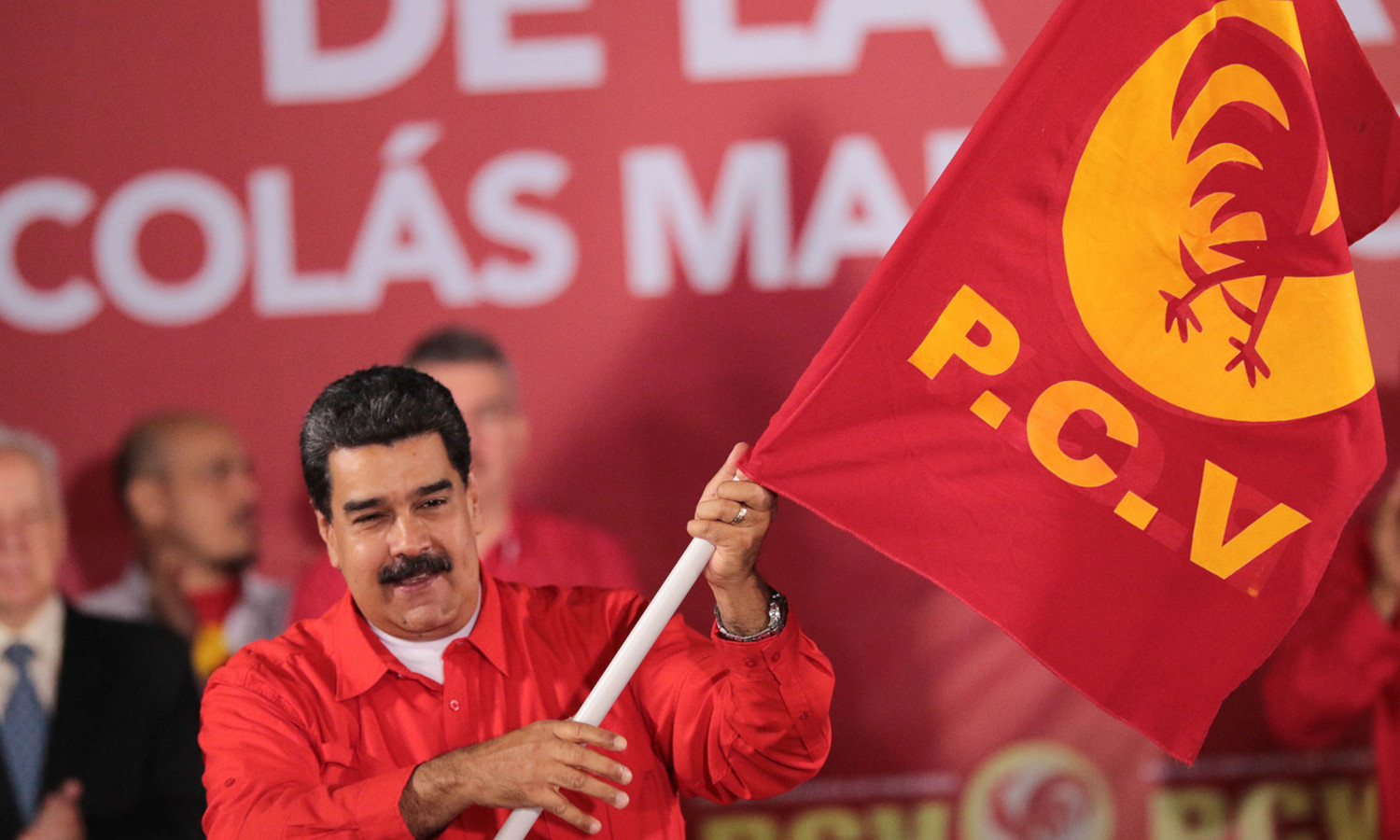
The recent history of the Communist Party of Venezuela furnishes further proof that the class struggle must be waged relentlessly on every front, both inside and outside the party. It highlights the necessity of keeping leaders accountable and members engaged with every development of a party’s organisational and political life. And it underscores the need for constant vigilance against opportunist ideas and careerist motivations with which our enemies constantly try to infiltrate the organisations of the working class.
The Communist Party of Venezuela (PCV), with its 93-year history, is one of the most representative, respected and heroic forces of anti-imperialism in Latin America.
Since its foundation, it has participated in all the struggles of the Venezuelan people, supporting the Bolivarian project of Hugo Chávez from the very beginning, as a member of the Gran Polo Patriótico Simón Bolivar (Simón Bolivar Great Patriotic Pole).
Later, the influence of the Trotskyist International Marxist Tendency (IMT) contributed to a change of the party’s political line. This resulted in greater differences between the PCV and the ruling PSUV party in relation to their interpretations of the Venezuelan reality. Finally, the Communist party broke away from the Great Patriotic Pole and helped to form the Popular Revolutionary Alternative (APR) in August 2020.
The increasingly critical position of PCV general secretary Oscar Figuera toward President Nicolás Maduro’s government brought the party into conflict with the Bolivarian process. In November 2022, this political line was approved by the party’s 16th national congress, and Oscar Figuera was re-elected as general secretary, deepening the confrontation.
Dissatisfied with the line being implemented under Oscar Figuera’s leadership, a large section of rank-and-file members launched a campaign to rescue the PCV from its turn to the right. They organised a series of events and regional conferences that culminated in an extraordinary congress in May 2023.
The delegates to this congress decided they had no option left to them but an appeal to Venezuela’s high court (Tribunal Superior de Justicia, TSJ), to regain their right to political participation and to return the party to its historic political line. Sure enough, on 10 August 2023, the court ordered the constitution of an ad hoc commission to reorganise the party (sentence No 1.160).
Compiling information gathered during interviews conducted between September and November 2024 with Henry Parra (interim president), Luisa González (PCV deputy to the national assembly), Zoilo Arostegui (national secretary for ideology) and Carlos Partidas (political secretary in Miranda state), this article examines the political differences that gave rise to the grassroots actions outlined above and assesses the PCV’s current situation.
Line of the party since 2002
During its 11th (2002) and 12th (2006) congresses, the PCV described the Bolivarian Revolution as an “anti-imperialist process of national liberation, opening the way to socialism”. At its 14th congress (August 2011), it reiterated these two conceptual pillars (“revolution of national liberation” and “socialist perspective”), and concluded:
“Since 1999, our people have been leading a new phase in their long anti-imperialist revolutionary struggle within the context of the world historical transition from capitalism to socialism. This phase is characterised by the existence of: a) a democratic, progressive, patriotic, anti-oligarchic and anti-monopoly government, part of a process of national liberation which is developing despite great difficulties, which promotes a more equitable distribution of wealth, and which is making progress in breaking the imperialist domination that still grips our country; b) conditions favourable to make way for the socialist perspective, depending on the construction of a new correlation of forces favourable to the working class and the working people in general.”
After this congress, the PCV supported Hugo Chávez in the 2012 presidential elections, where it obtained 489,941 votes (3.29 percent of the electoral roll).
As some members of the political bureau got closer to the International Marxist Tendency (IMT), an organisation that after the death of Comandante Hugo Chávez initiated a discourse of opposition and criticism of the Bolivarian process, this Trotskyist critique began to influence the PCV’s analysis.
In the document describing the political line of the 15th national congress (2017), there were expressions such as: “the narrow limits of the progressive-reformist project led by the Venezuelan petty bourgeoisie” … “[the] Bolivarian government, led by the radicalised petty-bourgeoisie, with a project of utopian socialism and a bourgeois state” … “the dominant social-democratic conceptions in the Bolivarian process, present since its beginnings, wield the fraudulent proposal of a socialism stripped of class struggle”. (Paragraphs 65, 77 and 114)
Moreover, in paragraph 96 of the document, the point of rupture was clear:
“The Great Patriotic Pole Simon Bolivar (GPPSB) did not go beyond being an entelechy, instrumental in pursuing the goals and views of the governmental leadership and the ruling party, only necessary for electoral occasions or in moments when a demonstrative declaration of patriotic unity was needed …
“The arrogance, self-sufficiency, sectarianism, hegemonism, imposition and the demand for unconditional submission and loyalty without discussion or consultation with allied forces, have conditioned the conduct and practice of the political leadership of the government, with clear and disastrous consequences in the political, economic, social, media and cultural, national and international spheres.”
Despite this change in the tone of its support, the PCV continued to back the government’s policies, and in its 14th national conference (April 2018) signed a ‘Unitary Agreement with the PSUV’ to support the candidacy of Nicolás Maduro for the presidency as a part of the Great Patriotic Pole (GPPSB). During the elections that followed, the Patriotic Pole obtained 6,203,612 votes and the PCV 171,043. (Tribuna Popular No 2,995, June 2018)
From April 2019, when the government submitted its plan for economic recovery, growth and prosperity (Plan de la Patria, or ‘Plan for the Homeland’, 2018-25) to the constituent assembly (ANC), the PCV leadership launched a series of open denunciations and protests against the government.
In August 2020, the party broke away entirely from the Great Patriotic Pole and joined instead in the formation of the Alternativa Popular Revolucionaria (APR), focusing on national assembly elections to be held later that year. The APR, a political coalition of six parties disenchanted with the Bolivarian process, obtained 168,743 votes under the PCV’s electoral card.
To justify their break with the Bolivarian process, Oscar Figuera and his leadership group made a series of statements, asserting that “the advance of a liberal, reformist and defeatist economic policy, in opposition to what was established in the PSUV-PCV agreements, constitutes the advance of a framework of rupture of the government and the leadership of the PSUV with the working class and the working people”. (Tribuna Popular No 3019, September 2020)
The preparatory document for the 16th national congress took an overtly hostile position towards the Venezuelan government and the PSUV, stating, among other things:
“As has been demonstrated, the illegal imperialist sanctions are not the cause of the capitalist crisis in Venezuela, but the expansive process of rentierism that violently collided with its limits in 2014 …
“The surrenderist disposition of the government is a key premise for the establishment of Mexico’s dialogues with the right-wing opposition and the public negotiations with the USA government …
“The government of the social-democratic PSUV leadership has become the enforcer in the name of capital to impose the anti-popular adjustment programme …
“If the PSUV bourgeois leaders remain in government or are displaced by the right-wing opposition in a future presidential election, the direction of the current anti-popular policy is not going to change at all.” (Paras 119, 133, 141 and 223, our emphasis)
In short, the impact of the 930 sanctions imposed by the imperialist bloc on Venezuela were further downplayed; the PSUV leadership was attacked and the party described as social-democratic and anti-popular; the government was accused of having a sell-out attitude, and the policies implemented in the ‘Plan for the Homeland’ were defined as a neoliberal structural adjustment programme of the IMF type.
At the 16th congress in November 2022, which was attended by just 89 delegates (387 delegates had participated in the 15th congress), Oscar Figuera was once more ratified as general secretary, a post he had occupied since 1996.
Concluding the congress, Oscar Figuera stated: “The sectors that are leading the political process in Venezuela, from their bourgeois class condition and mafia force, are imposing a capitalist way out – of handing over wealth, of destroying wages and the organisations of the working class – so they can facilitate a greater exploitation of our people by capital.” (Tribuna Popular No 3033, December 2022, p3)
The rupture between the Communist party and the Bolivarian project was complete.
Rank-and-file militants question the political line
The grassroots militants of the PCV, who have been working side-by-side with other political forces in defence of the Bolivarian process, were deeply dissatisfied with these events and with their leaders’ statements, and began a series of activities aimed at reclaiming their party.
According to the new president of the party, Henry Parra: “The militants decided to rescue the Communist party. Rescue the party from what? Rescue it from those who broke its political line. Rescue it from those who decided to go backwards. Because not to agree with Maduro and the Bolivarian Revolution at this moment was to agree with imperialism.
“We criticised the national leadership, whose positions were aligned with the right-wing opposition. The leadership was blaming Maduro and saying that he was responsible for the deterioration in the quality of life of Venezuelans, and especially of the working class. It did not consider that there was a criminal blockade against Venezuela imposed by US imperialism.
“The difference that I may have with Comrade Maduro or with his government can never be put above the revolution, of us surrendering ourselves to imperialism, to the very same discourse of imperialism. We cannot hand this process to the right wing. We are forbidden to turn back, because what is at stake here is not only Venezuela, but Venezuela, Latin America and the world. Venezuela, like Cuba, is the hope of the insurgent people.
“This is an insurgent people, who have rebelled against the biggest and most powerful empire that humanity has ever known, US imperialism. A communist party cannot betray the actions of a people who have sacrificed themselves for such a cause. If anyone has sacrificed themselves in defending this revolution, it is not the leaders of the revolution, it is the people. They are the ones who have sacrificed and resisted.
“I am not going to jump off the boat like a rat and leave the people who have sacrificed so much on their own. We have to make contributions to the leadership of this revolution, and contributions are not made by siding with the enemy.
“We say that if we cannot directly take power, then we have to share it, but we cannot be on the sidelines of what is happening here – the Communist party cannot separate itself from the masses. Figuera and his group have done it. They are from the Trotskyite tendency; they obey the Trotskyites; the Trotskyites finance them. Everybody knows that. The Greek Communist party (KKE) finances them. They are financed. They are financed.” (Our emphasis throughout)
In addition to the political differences with the leadership of Oscar Figuera, the rank and file of the party questioned the legitimacy of the 16th national congress, on the grounds that the party leadership had excluded them from participation.
According to Comrade Parra: “Many communists had already marginalised themselves, if they did not do this, they were marginalised. Because anyone who dared to confront the official policy against Maduro was excluded from all participation in party activities.”
Rank-and-file members began a series of conferences to question the political line followed by the Figuera clique. These included:
The first conference, of the Eje Oriental (eastern axis), included members from Monagas, Sucre, Anzoátegui, Delta Amacuro and Bolívar states. Held in the city of Maturín on 11 February 2023, it was attended by 180 delegates.
The second conference, of the Eje Llanero (plains axis), included members from Barinas, Apure, Cojedes and Portuguesa states. Held in the city of Barinas on 18 March 2023, it was attended by 208 delegates.
The third conference, of the Eje Andino (Andean axis), included members from Mérida, Táchira and Trujillo states. Held in the city of San Cristóbal on 22 April 2023, it was attended by 105 delegates.
The fourth conference, of the Eje Centro Occidente (west-central axis) included members from Aragua, La Guaira, Miranda, Guárico, Carabobo, Distrito Capital and Lara states. Held in the city of Caracas on 22 April 2023, it was attended by 362 delegates.
At these conferences it was decided to organise an extraordinary national congress. “Why was the decision taken to go to an extraordinary congress? Because the congress held by Figuera’s group ignored our militants. They hijacked the party and that congress was only attended by those who were going to raise their hands against the Bolivarian Revolution,” Comrade Henry Parra explained.
Finally, the extraordinary congress of 21 May 2023, held in Caracas with the participation of 520 delegates from 17 states, resolved to request an injunction from the high court in order to recover control over their party, thus ensuring the members’ right to political participation and the party’s return to its historical political line.
Political reasons for the high court appeal
According to Henry Parra: “It may seem strange that a court of the republic should take up an internal party problem. But in our country such a possibility exists.
“When we are not satisfied with an action of the party leadership, we can appeal to the highest instance of the party, which is the congress. But it was at the 16th party congress that internal democracy was not practised, and many lifelong militants were excluded from that congress. That is why we, a group of men and women who have been militants of the party for a long time, got together and decided to take action against this national leadership.
“The Figuera leadership, which had already distanced itself from the revolution, had positions that coincided with the discourse of the right. It maintained a permanent attack against Comrade Nicolás Maduro. Seemingly unaware that we are living through a blockade of 930 measures against the revolution.
“They wanted to ignore the blockade as the great culprit of the ills that our people are suffering. Because what was happening to our people was caused by the blockade. But our people had great resistance, and today we can say we are defeating it.
“But in any case, our party had two situations. First: the political line of the party had been set aside. What is the political line? We are anti-imperialist almost by birth. The first thing I learnt in the Communist party, and which we all learned, was to be anti-imperialist in Latin America, antifascist in Europe.
“But today we are anti-imperialist and antifascist. Because we understand that just as imperialism is a higher stage of capitalism, fascism is also a higher stage of capitalism in decadence. It is an instrument used by big capital to try to survive through repression. This is clear to us communists. And in the face of this we say we will act.
“There was a party congress. They did not recognise us, and instead elected authorities who continued to violate the political line of the communists. Historically, in the statutes, our anti-imperialist attitude appears everywhere.
“To attack Maduro at that time was to agree with imperialism. We can have differences with Comrade Maduro. This is not a socialist revolution, it is a process of national liberation towards the construction of a socialist homeland. We are clear about that too.
“But we also understand that the great majority of the problems that have been generated for the people were generated from the blockade, because when Comrade Chávez was there (and we declare ourselves Chavistas, too), Comrade Chávez had oil at one hundred dollars per barrel, one hundred and ten dollars a barrel, and two million barrels of production.
“Comrade Maduro came and the sanctions brought revenues down to zero. Prices were down to seven dollars per barrel of oil. They destroyed the Venezuelan economy, and with that they wanted to destroy the revolution – but they did not succeed.
“But the group that was leading the Communist party didn’t understand any of this and looked like agents of the empire. So we acted in a court of law. Why in a court of law? Because we couldn’t go any further, the congress that was held was the highest instance [within the party]. The only thing left was to go to a court of the republic that guarantees civil and political rights to Venezuelans.
“And the courts of these republics obey the revolution. Because they are courts built in revolution. That is not what has happened in other parts of Latin America and the world. Elsewhere, the judicial system managed by the right used the courts to put an end to revolutionary processes.
“But Comandante Chávez had the vision to transform the courts, the prosecutor’s office, the ombudsman’s office. Chávez had that vision – a vision that has served us well. Because then we, more than 500 comrades, appealed to the supreme court of justice and demanded the democratisation of the Communist Party of Venezuela in its process of electing its authorities and in its process of drawing up its political line. And the court agreed with us.”
Luisa González (PCV deputy to the national assembly), responsible for women’s organisation, told us: “The process for which we have been fighting in the last year has been a complex one, because a very small group of the previous national leadership knelt down to the fascist extreme right.
“In this situation, the real militants of the Communist party asked the current president of our party, Comrade Henry Parra, to take legal action before the institution with the highest legal power in our country, which is the supreme court of justice. Our comrades of the national leadership are making progress; they are deployed all over the country, in every corner of the 24 states.
“Meetings are being held, assemblies of genuine party militants, of all those who support our revolutionary process, and the supreme court gave us the reason in its pronouncement. The neofascist faction on its knees to imperialism has maintained its hostile posture, but we who represent the real militants, 80 percent of the state committees are supporting the revolution.”
Carlos Partidas (political secretary for PCV in Miranda, the second most important state in the country, and part of the metropolitan axis of Caracas), added: “This process that the Communist party is going through, based on the conflict that we have had with this group of people who were finally expelled from the party, is very sui-generis [unique]. It is not like the classic processes of division that other communist parties or revolutionary movements have experienced, either in Venezuela or elsewhere in the world.
“Why? Because the state, through its institutions, is involved. And why is this happening? Because we are in a revolutionary process that has been transforming the country over the last 25 years. Not only by improving the conditions of the population, but also the entire legal framework of this project to build socialism.
“Because it is a project for the construction of socialism, which is at a certain stage, but which aims at the construction of socialism …
“The revolution gives guarantees to the entire population about the civil and political rights that Venezuelans have. And parties are also subject to these laws that the revolution has built to guarantee Venezuelans their participation; to ensure that this right is not taken away by any leadership of any party or organisation that tries to alienate the rights of its collective, or of the collective it manages.
“So the party militants were forced to go to the high court. It must be pointed out that the decision to appoint the ad hoc commission [for reorganising the PCV] was not taken by a local court, but by the highest court in the country. I wanted to underline this, because many comrades around the world don’t understand why we sought the intervention of a state institution.
“Besides, there are those who claim that ours is not a revolutionary state, so they associate its state institutions with institutions that are not revolutionary. But our institutions are revolutionary. Because they are led by revolutionaries, because they are part of a revolutionary project that seeks the construction of socialism. This is what our founding leader, the eternal commander Hugo Rafael Chávez Frías, declared, and this has been also supported and declared by our president Nicolás Maduro.
“The Communist party supports this project. We will always support it, and will defend it against imperialism and fascism and any other force that seeks to destroy this process or to stop this project by whatever means.”
High court legal case
On 10 July 2023, Henry Parra, accompanied by other comrades, applied to the Venezuelan high court for legal protection of their right to political participation and to taking part in defining their organisation’s political line. They highlighted the systematic violations of the organisation’s statutes by which they had been prevented from rescuing the PCV’s political line and showing their support for the Bolivarian Revolution.
According to Henry Parra, the litigants went to the court “to ask for justice. We want to be recognised as militants of the Communist party and we demand that there be a new congress in the party, where each and every one of the party’s lifelong militants is allowed to participate.”
In their petition to court, requesting effective protection of their constitutional rights to political participation within the party, the grassroots militants stated:
“The crisis that has worsened in the party is not generational or by jobs in the party, but expresses the antagonistic contradiction between the need for the revolutionary reconstruction of the Communist Party of Venezuela against continuing to maintain a small group that hijacked the leadership of the party and the Communist Youth of Venezuela (JCV) and imposed a careerist and authoritarian regime that usurps functions, restricts internal democracy and the right of participation, and has systematically betrayed the founding principles and strategic objectives of the Venezuelan communists, leading a political organisation of left principles and fundamentals guided by the conception of Marxism-Leninism to raise the flags of the most fascist right wing, use its same discourse and accompany its counter-revolutionary manifestations, all this, with its back to the will of its militancy.” (p6)
They denounced the way that “the political bureau carried out selective political operations in which they designated parallel regional teams which they called ‘reorganising commissions’ which are nothing more than disguised interventions in those states in which they wanted to exercise control of the regional committees because they considered their members ‘uncomfortable’ and contrary to their individualist interests of enthroning themselves in the central committee”. (p7)
The magistrate in charge of the case, having established the competence of the court, stated:
“Citizen Oscar Figuera, in his capacity as general secretary of the central committee of the political bureau of the Communist Party of Venezuela, has omitted to convene the grassroots bodies, as well as avoided holding the organisation’s congresses, preventing the militancy from acting in accordance with the statutes and, more importantly, exercising the leadership of the organisation in violation of the principle of alternability that informs the right to political association by imperative of the aforementioned Article 67 of the Constitution of the Bolivarian Republic of Venezuela.
“Thus, the violation of the collective rights of the members of the Communist Party of Venezuela, due to the lack of development of the different mechanisms of participation that form part of the right of association and must be guaranteed in political organisations due to the democratic nature that informs them, imposes on this Chamber the duty to appoint an ad hoc directive in order to reestablish the right to association and participation of all members of the organisation.” (Ruling No 1.160, 10 August 2023)
The court thus appointed an ad hoc board of directors to reestablish the right to association and participation of all PCV members, and appointed Henry Parra as interim president; Sixto Rodríguez as general secretary; Griseldys Herrera as secretary; Carlos Figueroa as finance secretary; Zoilo Arostegui as secretary for ideology; Johan Coraspe as secretary for agitation and propaganda; and Robinson García as secretary for agrarian and peasant workers.
On 14 December 2023, Oscar Figuera requested the revocation of the court’s decree, arguing that the regional axis conferences had not been authorised in accordance with the party’s statutes; that the delegates had not been party members; that the members of the ad hoc commission were not party members; and that there were discrepancies between the number of delegates and the number of signatures on the court petition.
The high court’s constitutional chamber reviewed the case and upheld its conclusions, rejecting Figuera’s appeal. (Ruling No 0061, 6 February 2024)
According to Henry Parra: “We demonstrated in a political document all the violations of the statutes that took place during the congress. The court decided that an ad hoc commission had to be appointed to go to a new congress and apply the statutes of the Communist party and the laws and the constitution that regulate electoral and political matters in Venezuela.
“That is what they did. They did not say to Figuera and his group: you are excluded. They told them: you have to submit to the ad hoc commission to call a new congress because the 16th national congress (November 2022) was flawed. That’s what the court decided.
“Figuera’s group did not abide by this decision because they claim that it was a ‘bourgeois’ tribunal. When they needed it for other things, it was a revolutionary tribunal, but now that the sentence was not in their favour, it had become a bourgeois tribunal.
“When this revolutionary court took the decision to go to a congress, we called them to a new congress, but they did not recognise the decision. In the long run, we had to expel them because they started to openly agree with the right wing [fascist opposition forces]. We didn’t expel them when the court appointed us. We told them: Let’s talk, let’s agree to call a new congress. But no, they wouldn’t accept the decision.
“What did these comrades who felt affected have to do? Accept the decision. But their arrogance did not allow them to see that it was possible to have a discussion with us. And so they preferred to isolate themselves.”
On the ad hoc reorganising commission
The Figuera clique told the high court that the members it had appointed to the ad hoc commission were not party members. According to Henry Parra: “The supreme court’s decision was to appoint a commission of seven on an ad hoc basis. Their primary objective was to call for a participatory democratic process in accordance with the party’s statutes and the constitution, and to elect a new board of directors, because the election at the last congress had been flawed.
“They appointed seven members. Of the seven members, five of them were lifelong militants of the Communist party and two of them were newcomers. One had already been expelled and the other one has conformed to the party line in terms of his conduct and militancy, but none of them come from another party.
“Comrade Johan Coraspe comes from the communist youth; comrade Zoilo Arostegui comes from the communist youth; Comrade Sixto Rodríguez is an old militant of the party, he was a guerrilla fighter, he was our deputy in Carabobo state; Robinson García was Figuera’s driver, and I can tell you that he must be highly trusted in the Communist party to have been the general secretary’s driver.
“I began to join the military days after the fall of Comrade Salvador Allende. That was 11 September 1973, and on the 16th and 17th, I was enrolling in the ranks of the revolution, to make the revolution, not to be a revolutionary, and the communist youth enrolled me. From there, we have been occupying space in the leadership of the party. I was a member of the central committee, I was a regional leader, political secretary of my region, Táchira, a state bordering Colombia.
“And now they want to disown us as communist militants. That is the story they are spreading abroad. That those who currently lead the party are not communist militants. But there are five of us who are lifelong militants of the Communist party. In other words – they lied to the world.”
Reorganising the party from the grassroots
A year has passed since the high court ruling was made. We asked Comrade Zoilo Arostegui about the progress of the ongoing reorganisation: “The very small faction of former comrades of the party who deviated from our programme, from our political line, led the Communist Party of Venezuela into a very difficult situation. They did a lot of damage. The PCV was decimated.
“We went through a process of recovery that came from the grassroots. In my case, I was always a grassroots militant. Today, the PCV is led by grassroots militants – workers, peasants, fishermen – all at different levels of leadership. We also have cases like the president of the party who held leading positions within the party.
“But today, the Communist party is led by its rank and file. We have rescued the party, rebuilt the party, and we have achieved the goals we set for the presidential elections and the reorganisation of the party.
“Our party is present throughout the national territory. We have political teams in every state, and we even obtained historic electoral results of participation that we had not had in the times before we rescued the party.”
Henry Parra told us: “The old militants have been joining this process, and today we can tell you that we have already organised all 24 states of the country – 23 plus the capital. We have organisation in all of them, even in Amazonas. Now we only need a committee in Guayana in the recently created state of Esequibo.
“We are in the process of registration and re-census to establish what membership we currently have with a view to a new party congress.”
In response to a question about a new party congress, Comrade Parra said: “We are working on a date in the first half of 2026. Why not right now? Because the party never holds congresses during election periods. In 2025, there will be three elections, which we presume will take place between May and June.
“The first will be for mayors, councillors and municipal councils, the second will be for governors and legislators, and the third for deputies at the national level. We are taking advantage of this recess, when there are elections, to consolidate the party branches.”
Regarding the preparatory documents for the congress, Parra explained: “We are appointing commissions that will be in charge of drawing up the political document, the statutory reform. It will have to be done, because Venezuela has a particularity that cannot be developed in other countries in the world.
“Today, this country is trying to build socialism with communes; starting from the commune. But in the political thesis of the Communist Party of Venezuela there is nothing that mentions communes.
“One of our political requirements today is to review what the role of the commune really is and what leading role it is going to have in this revolution. From what we are sensing, it seems that the intention is to give a leading role to the local communes over and above the mayors and governors. The time will come when mayors and governors will be replaced by communal governments.”
Role of the PCV in the Bolivarian process
We asked Comrade Henry Parra what the PCV contributes to the Bolivarian process. He told us:
“First, because of our principles, it was here where we had to be, not somewhere else. This is our place. Historically, we are right, this is a project that has been working for 25 years. We had to be at the side of the revolution. Because if this revolution falls, fascism will take over Latin America. Not just Venezuela, but Latin America. Venezuela will be the geostrategic spearhead of fascism.
“It was to give them that, to give them a homeland that was going to be used with military bases to stop any revolutionary advance in Latin America and in the world [that the US imperialists are working to overthrow Maduro and the PSUV]. We understand that. I don’t know if the communist parties [elsewhere in the world] that are supporting Figuera and his group understand that.
“Second, we guarantee the unity of all the revolutionary parties with Comrade Nicolás Maduro for the elections. We give a name to the revolution; the name of left revolutionary is given by the Communist Party of Venezuela. By the tradition of the party. Who gives that name? We do.
“Thirdly, as far as the elections are concerned, we contributed our votes, the vote of the communists. We came out very well from where we had been. What’s more, our candidates beat the other Polo Patriotico parties, except for the PSUV and Futuro, and we were well positioned numerically.
“But, in addition, this was a moment when no one could fail. On 28 July 2024, no one could fail. We could not be allowed to fail, it was forbidden for us to lose, because we were not only going to lose the elections – we were going to lose our lives. There are many comrades who have not realised that this is a revolution, many comrades of the great Patriotic Pole who sometimes say to us: What can be proposed here is the alternation of power. We say, there is no question of alternation of power here; it is either a revolution or it is not a revolution.
“In other words, we made a great contribution. And that is what we wanted. If tomorrow the four of us have to die, we die with glory. We did the revolutionary work we had to do. We communists made our contribution so that this revolution would not be handed over to fascism.”
How the PCV dispute is seen in the wider communist movement
The differences within the PCV did not go unnoticed by the enemies of the Bolivarian Revolution, and the issue of the party split was widely publicised around the world.
From one side, the monopolistic right-wing media published hundreds of articles reporting on the intervention of a left-wing political party that was not sympathetic to the government of president Nicolás Maduro. These mainstream media, while supporting the self-proclaimed ‘President Guaidó’, at the same time supported Figuera and his group as they castigated the Bolivarian process for its lack of democratic content.
On the other side, communist parties aligned with the Greek Communist party (KKE) repeated Figuera’s diatribes against the Bolivarian Revolution without comment. This unconditional support for Figuera, which concealed the underlying ideological debate and the allegations of nepotism and manipulation against the old leadership clique, prevented many communists from realising that there was another version of events.
The result has been that only one version of the PCV’s recent history is known around the world – the slanders against the Maduro government and the Bolivarian Revolution that have been spread by Figuera and co.
According to Henry Parra: “We know that some communist parties in the world support Figuera and his group. We understand this; we understand why we have not made a world advance. Because we are in a political moment in Venezuela where we need to resolve internal issues and guarantee the victory of Comrade Nicolás Maduro. That was our big task, and we left the external issues for later.
“As [former Mexican president] Comrade Amlo, Andrés Manuel Lopez Obrador, says, ‘the best foreign policy is the best domestic policy’. The best policy we can do is to show the communist parties of the world the development of the Communist party in Venezuela.
“Recovering the Communist party is still our task. We have consolidated the party at the national level. But we need to go deeper. In other words, we need to give the Communist party grassroots consistency. We are doing very well. We say to the communist brothers and sisters of the world that what we have here is a group of revolutionary men and women who are committed to a revolutionary process that affects the whole world for better or worse.
“We need this revolution to have the backing of all the communist comrades of the world. Make no mistake, comrades. We are here, irreducible and we are going forward. And we have the task, as I told you, of taking our message to the world.”
Zoilo Arostegui added: “It is important that our communist comrades around the world know that there is only one party, a single party with 93 years of history. One that is twinned with the revolutionary processes of national liberation throughout the world.
“But those people who were entrenched in the leadership of the party until recently have a great, let’s say, sounding board within social networks and throughout the world’s media – to such an extent that our version, the truthful version, the version that has a social and political base and which really exists in the country, is invisible.
“They have a greater voice on the world stage; they have media support and an international echo. But it is important not to be fooled, comrades. We are at a time when the revolutionaries of the world must unite, must strengthen ties of solidarity among ourselves and be vigilant against all these deviations. And above all, we must draw attention to the fact that the enemies of humanity support, finance and create the conditions for these versions to be as widespread as they are today. And our version – as I repeat, the version that has a people, that has a vote, that has a party, that has an organisation – is rendered invisible.
“We have a great challenge in the immediate future. Once this electoral stage, this stage of triumph, of consolidation of the process, is over. We are in the midst of a constant threat of a coup d’état. It is like an octopus with a thousand arms. Imperialism is stalking us in different ways.
“However, here we are, unyielding, we are moving forward. And we have that task, to take our message to the world. We need the support of our allies, the revolutionaries of the world. We need them to spread the understanding that here we have a revolutionary Communist party, committed to humanity, to life, to a new world, to a multipolar world, to an ecologically sustainable world. We are in revolution, comrades, and we greet you from Venezuela.”
Chronicle of a death foretold
As in Gabriel García Márquez’s celebrated novel, in which everybody in Riohacha knew what was going to happen to the main character except himself, so in Venezuela all the people know what is going to happen except Oscar Figuera and his group.
The fact is that abandoning a revolutionary process because of differences that are not related to the main contradiction has led this group to break with the Bolivarian project, and to allow their criticisms to merge with those of the Venezuelan extreme right.
This statement is not made arbitrarily. It is based on an analysis of publications such as Tribuna Popular (a paper published by Figuera’s group), which demonstrate the total coincidence of the views of the Figuera group and those of the fascist extreme right. This coincidence has caused Figuera and co to lose all legitimacy in the eyes of the Venezuelan masses, even though the mainstream opposition media generously reproduces their opinions.
In the July 2024 elections, the Venezuelan people turned their backs on these anti-revolutionary positions at the ballot box. Figuera’s group, which supported Enrique Márquez of the ‘Centrados en la Gente’ party, received only 29,611 votes – a mere 0.24 percent of the electoral roll.
According to Henry Parra: “What went over the top, as we say in Venezuela, was when they decided to support Enrique Márquez, a fascist and an anticommunist. This anticommunist was María Corina [Machado]’s option case of Edmundo González’s death.
“There seemed to be a real possibility that he would die, but he suddenly revived in Europe. I don’t know how, but he revived so much that now he’s going around looking very energetic, although he seemed to be dying before. It seems that he [González] didn’t want to campaign and was pretending to be ill. We thought Enrique Márquez was going to replace him [as the preferred candidate of the far right], and Figuera appeared to support that.”
Luisa González added: “We communist women are supporting this socialist process. We abhor and reproach the position of that very minor faction that was in the Communist party. Above all that in the election process of 28 July they supported a candidate of the fascist extreme right, who is also anticommunist.
“We are deeply offended by that. These actions were taken by citizens who put their hands up [in surrender] and decided to try to put the Communist party on the back foot before the American empire. And from the women’s trench I say to you: the communist women of Venezuela support our president Nicolás Maduro Moros.”
While Figuera’s group continues to expel lifelong PCV militants using its ‘National Commission of Discipline and Control of Cadres of the Central Committee’ – as in the recent cases of Carolus Wimmer and Ursula Aguilera (August 2024) – many others have decided to follow new party president Henry Parra and the majority grassroots.
On the comrades who had left the party but who wish to return to its ranks, Henry Parra explained: “We are studying the possibility of incorporating a group of people who accompanied Figuera but who are now saying: ‘We want to return to the party again.’ Our first condition is that they recognise the ad hoc board. They must recognise us as directors.
The second condition is that they recognise the PCV’s support for the Bolivarian Revolution. It’s not that we support Maduro; Maduro is a circumstance. It’s because we support the Bolivarian Revolution. It must be understood that if tomorrow comrade Johan Coraspe is proposed as a candidate, we would support him also. Because we support the Bolivarian Revolution.
“Finally, that our party is guided by the scientific conception of Marxism-Leninism, the emancipatory, anti-imperialist and integrationist ideal of Simón Bolívar and by the principles of proletarian internationalism, international solidarity with the peoples fighting for their national liberation, popular democracy, progress, social welfare and socialism.”
The militants of the historic Communist Party of Venezuela, who have worked to recover the anti-imperialist traditions of the party and its support for the Bolivarian Revolution, tell us with their work:
Siempre leales a la revolucion! Traidores nunca!
Always loyal to the revolution! Never traitors!
https://thecommunists.org/2025/07/01/ne ... new-stage/
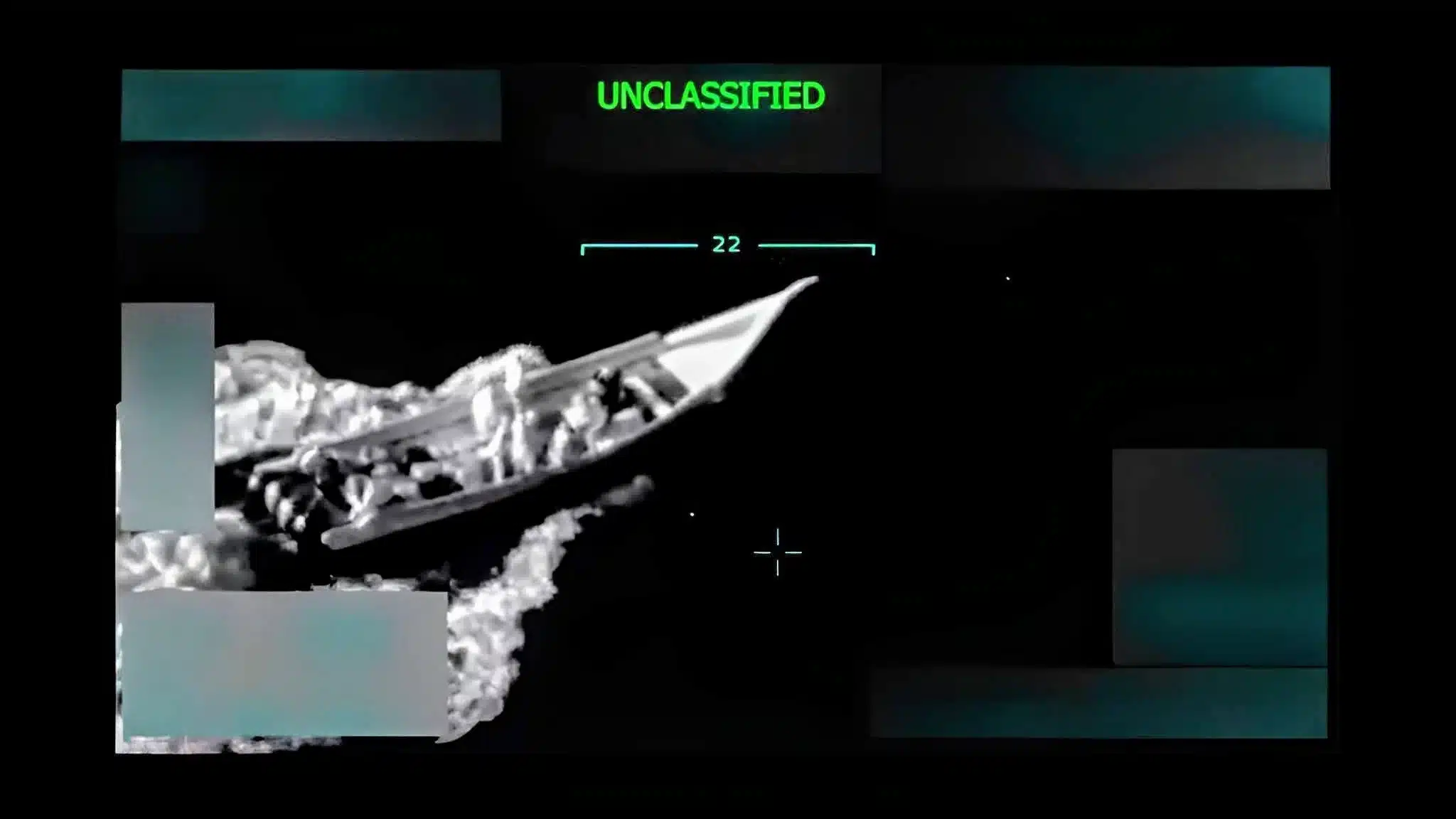

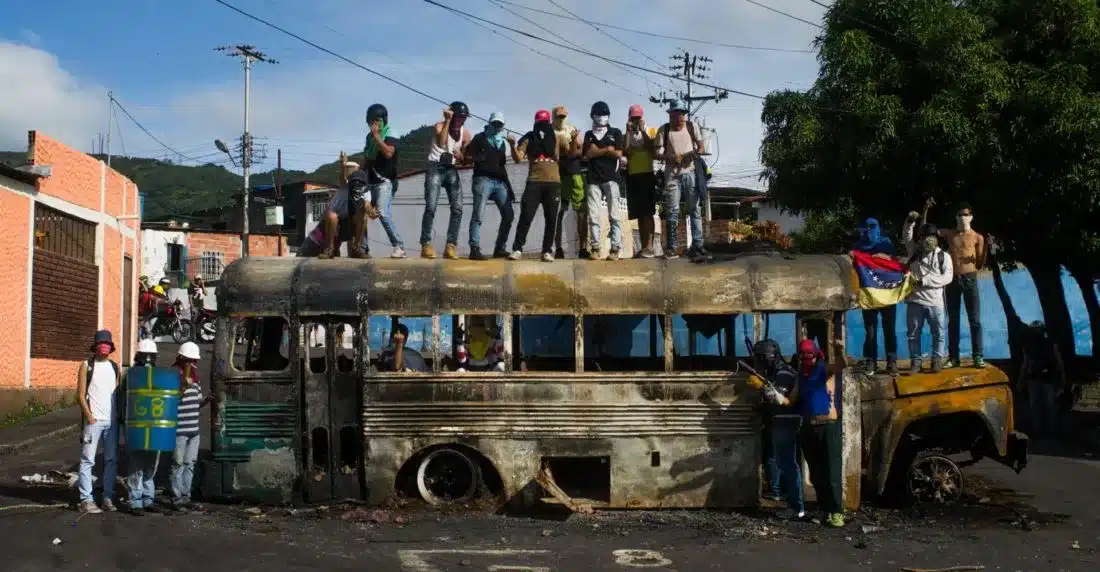





 The Cayapo
The Cayapo
